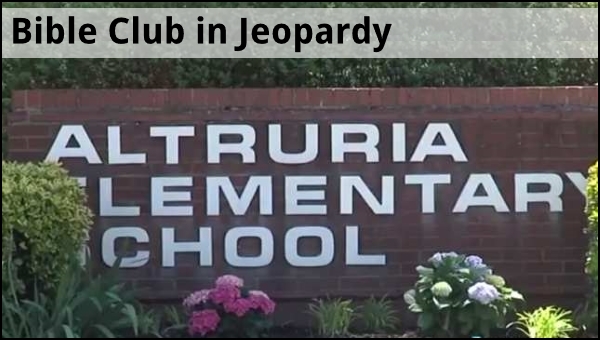By Tyson Thorne

In high school, friends and I started a Bible club at our public school. It was a place where Christians and those who were Jesus-curious could come together and discuss the relevance of the Bible and of a relationship with God. We called it “Academic Bible Club” which helped us overcome objections from the administration about permitting an obvious religious group meet at the school. The school was very hostile to any attempts my friends and I made to influence students and teachers with the message of Jesus. We adhered to the law, however, and they had to capitulate.
The same cannot be said of a Bible club at Altruria Elementary school in Tennessee. While attending the Bible club is completely voluntary, the Freedom from Religion Foundation (FRFF) found legal cause to have the club suspended for the remainder of the school year. This is bad news, as it leads people to believe that Bible clubs in public schools are generally illegal, which is the opposite of the truth. So what is different between what my friends and I did in Colorado and what is being done in Tennessee? A lot, as it turns out.
While not against the law, the focus of the Altruria Bible Club was first and second graders. Since children that young cannot lead themselves they needed an instructor, and in this case that instruction came from teachers at the school. Having teachers lead the club does make it feel state sponsored. Also, since the classes are relatively small, there is undue pressure on students attending which creates a tough social situation for a child to respond to. As much as I dislike the FFRF, and as much as they misunderstand the US Constitution, they might have a case in this instance.
By contrast, the Academic Bible Club my friends and I started was a student initiated and student lead program. We often took turns leading the meetings, giving valuable training to everyone involved. There was also no teacher or state involvement – in fact the opposite was true as teachers frequently made clear their distaste for the club. We were assisted with curriculum and other ideas from an outside agency, further separating the support for the club from the school and the state. These distinctions mark the difference between legal and potentially illegal activity.
Alturuia Elementary wants to bring the Bible club back next year, but to do so requires some pretty drastic changes. It should be sponsored by people with no connection to the school, like parents or even a local pastor or seminary student. Also, the new leadership should be prepared to talk ease their concerns of parents who do not want their children involved and provide guidance about how to talk to their kids so the student doesn’t feel left out.
Most important, however, is that the club return in a way that meets all legal requirements. It is vital that this situation be turned into a win for the Bible club movement, and not become a strategy for opponents to use against other clubs. While the value of a Bible club for such children is less than it is for older students who need a way to reinforce their faith, teaching the Bible and its relevance to being a good person is a great goal for Altruria Elementary kids.
There is no law against teaching the Bible in public schools, as it is a taxpayer funded institution. Also, we need more Christian influence in the public square, which Bible clubs help accomplish. Our hope at Think-Biblically.com is that the parents and teachers of Altrutia can get this right for the 2017-18 school year and offer our help and insight in doing so.
|
|
